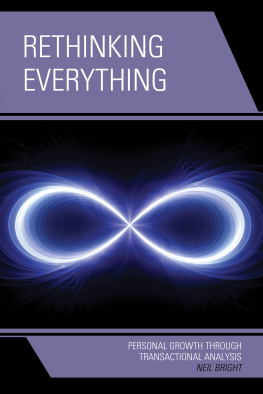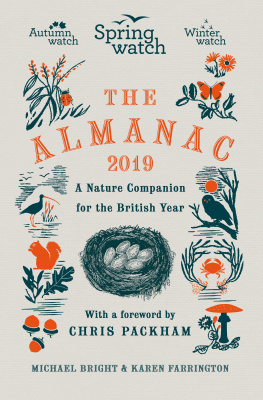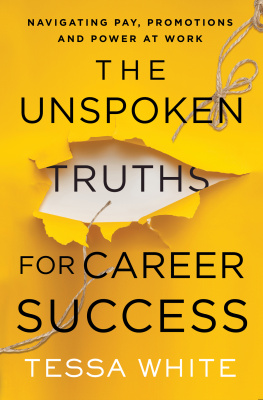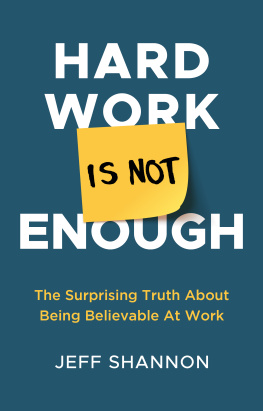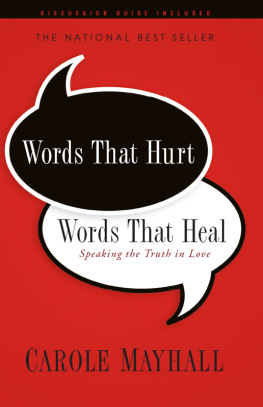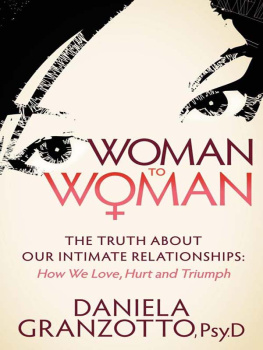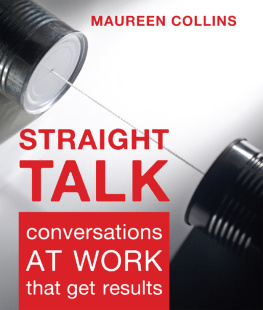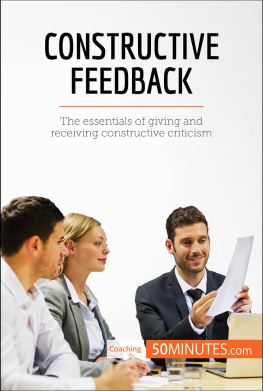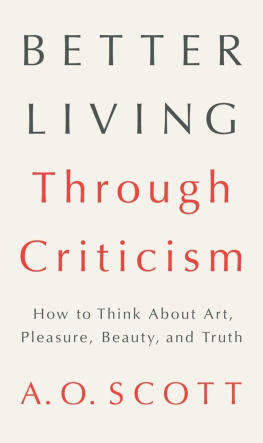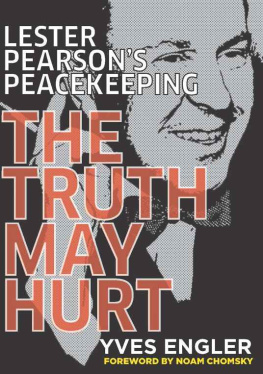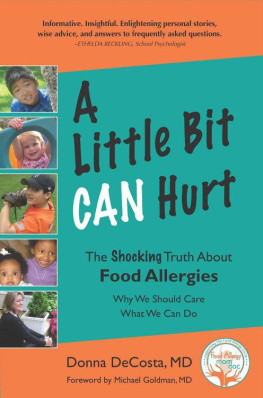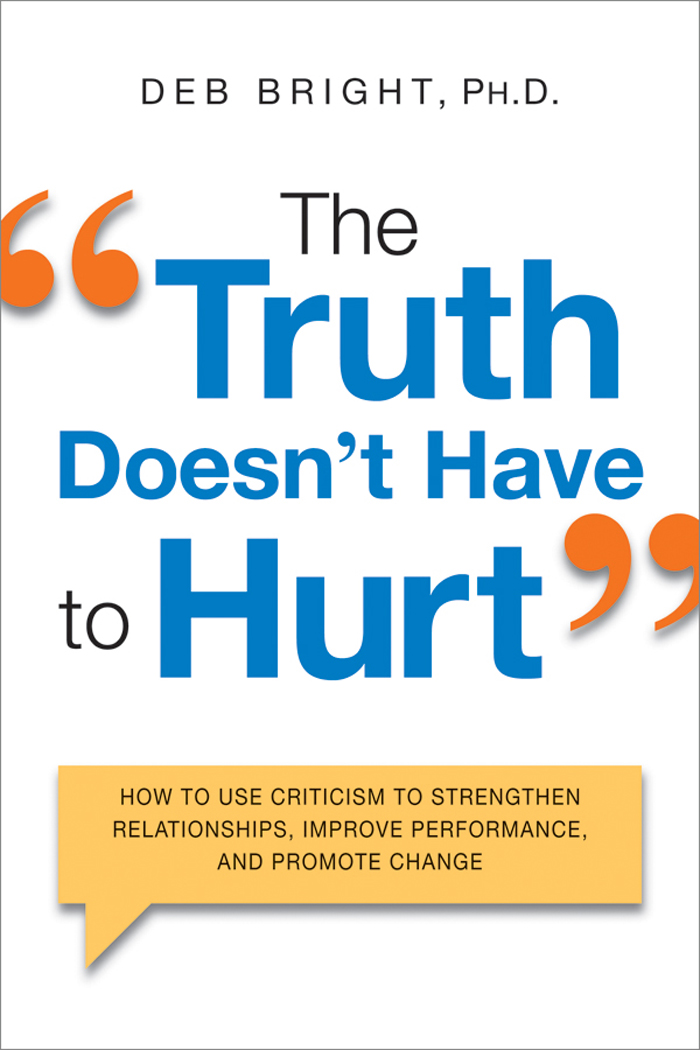The Truth
Doesnt Have
to Hurt
The Truth
Doesnt Have
to Hurt
How to Use Criticism to Strengthen Relationships, Improve Performance, and Promote Change
DEB BRIGHT

American Management Association
New York Atlanta Brussels Chicago Mexico City
San Francisco Shanghai Tokyo Toronto Washington, D.C.
Bulk discounts available. For details visit:
www.amacombooks.org/go/specialsales
Or contact special sales:
Phone: 800-250-5308
Email: specialsls@amanet.org
View all the AMACOM titles at: www.amacombooks.org
American Management Association: www.amanet.org
This publication is designed to provide accurate and authoritative information in regard to the subject matter covered. It is sold with the understanding that the publisher is not engaged in rendering legal, accounting, or other professional service. If legal advice or other expert assistance is required, the services of a competent professional person should be sought.
Library of Congress Cataloging-in-Publication Data
Bright, Deborah.
The truth doesnt have to hurt : how to use criticism to strengthen relationships, improve performance, and promote change / Deb Bright.
pages cm
Includes index.
ISBN-13: 978-0-8144-3481-9 (pbk.)
ISBN-10: 0-8144-3481-9 (pbk.)
ISBN-13: 978-0-8144-3482-6 (ebook)
1. Criticism, Personal. 2. Interpersonal relations. 3. Performance. 4. Change (Psychology) I. Title.
BF637.C74B753 2015
158.2--dc23
2014020765
2015 Deb Bright
All rights reserved.
Printed in the United States of America.
This publication may not be reproduced, stored in a retrieval system, or transmitted in whole or in part, in any form or by any means, electronic, mechanical, photocopying, recording, or otherwise, without the prior written permission of AMACOM, a division of American Management Association, 1601 Broadway, New York, NY 10019.
The scanning, uploading, or distribution of this book via the Internet or any other means without the express permission of the publisher is illegal and punishable by law. Please purchase only authorized electronic editions of this work and do not participate in or encourage piracy of copyrighted materials, electronically or otherwise. Your support of the authors rights is appreciated.
About AMA
American Management Association (www.amanet.org) is a world leader in talent development, advancing the skills of individuals to drive business success. Our mission is to support the goals of individuals and organizations through a complete range of products and services, including classroom and virtual seminars, webcasts, webinars, podcasts, conferences, corporate and government solutions, business books, and research. AMAs approach to improving performance combines experiential learninglearning through doingwith opportunities for ongoing professional growth at every step of ones career journey.
Printing number
10 9 8 7 6 5 4 3 2 1
Contents
Acknowledgments
The impetus for writing this book would not have been possible without the initial support and contribution of Dr. Mark Pochapin, founder of the Jay Monahan Center in New York. Together we began what ultimately resulted in a seven-year journey that finally culminated in the Strategies for Enhancing Performance Study, which became the foundation of the research upon which much of this book is based.
What we learned from surveying over a thousand workers in the Northeast is that criticism, whether as a giver or receiver, is among the top ten most stressful factors affecting performance in workplaces. While exchanges involving negative feedback do not occur all the time in the average workers day, when they do, they are stress-producing.
The Strategies for Enhancing Performance Study itself, and the many subsequent journal articles on it that followed, would not have been possible without the participants who engaged in the experimental control design study. A special thank you goes out to those organizations and companies who participated in this effort. They include: Aetna, Bankers Life and Casualty, Executive Womens Golf Association (EWGA), GE Healthcare, Hadassah, the Ladies Professional Golf Association (LPGA), Morgan Stanley, NAI Horizons, New York Association of Homes and Services for the Aging (NYAHSA), New York Hilton Hotel, NYSE Euronext, and the University Medical Center (UMC). It was through the employees participation that we learned what skills in todays workplace lend themselves to improving performance while simultaneously mitigating the negative effects of stress.
I also want to express my thanks to Dan Manship for sticking with me throughout the process of writing this book. The researching and subsequent documentation, along with the arduous task of inputting the material, took a lot of work on his part and it is greatly appreciated. Thanks for making sure the books message was clear and moved along smoothly goes to David Gould and his great editorial skills. Karen Moraghan from Hunter Publications also deserves a thank you because she introduced me to David and was so helpful in the promotion of the book.
Naturally, the book would not have happened if it werent for my most helpful and dedicated agent, Katie Kotchman, of whose encouragement and persistence I am most grateful. Her conscientiousness and belief in the subject was all inspiring. It was through Katie that I met Ellen Kadin, my talented editor at AMACOM. Ellen is a person whose main talents are motivation mixed with inspiration and kindness. I thank her and greatly respect her for her spot on advice and for always being so easily accessible. Working with Ellen, Erika Spelman, Irene Majuk, and all the enthusiastic staff at AMACOM was a pleasure, and I wouldnt hesitate to do it all over again!
Also, thanks needs to go out to the women at WATT (Women at the Top). This is a group of highly successful Tucson, Arizona, entrepreneurs and business executives who are at the top of their game, whose opinions I respect without question and whom I have come to like personally.
A special thank you also needs to be extended to Penelope Boehm, President of Boehm Business Services, a good friend and successful business owner, for her help with surveying Toastmasters members.
And most important, a very special thank you goes to my husband, Paul. He is my best friend, my lover, my confidant, and my most cherished critic. He was so helpful in stimulating thought and making sure that what was written was well thought-out and would stand the test of time.
A final thank you goes to all of those individuals in the workplace today who understand criticism and the vital role it plays in enhancing performance and building quality relationships and bringing about change. Its those believers I want to thank because they understand that the goal is not to promote more criticism in the workplace today ... rather it is to engage in helpful criticism exchanges because only when we do that can individuals realize their full potential and organizations maintain their competitive edge.
Introduction
The trouble with most of us is that we would rather be ruined by praise than saved by criticism.
NORMAN VINCENT PEALE
Standing 10 meters above the earth, balancing on the edge of a diving platform, I would listen to my coach yelling corrective instructions about what I needed to do to make my next dive better. Most people would consider his harsh admonishments mixed with encouragement as criticism, but for me, it was direction, instruction, and insight. Through training and a plentiful amount of no-holds-barred criticism from him, I was able to exceed even my own expectations as a diver. Because I accepted his criticisms as helpful, I eventually became ranked among the top ten women divers in the United States. Unfortunately, my career in platform and springboard Olympic competition ended suddenly when doctors discovered retinal tears in both my eyes. Had I continued, I was told, blindness would have been the inevitable result.


